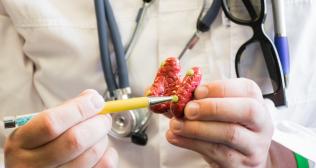
What is PCOS: Understanding the Challenges and Management
Introduction
Polycystic ovary syndrome (PCOS) is a significant cause of anovulatory infertility, affecting approximately 4–18% of reproductive-age women. Often, PCOS goes undiagnosed until fertility concerns arise. Characterized by hormonal imbalances, including elevated luteinizing hormones and androgens, PCOS results in irregular menstrual cycles and ovarian cysts. These hormonal disturbances not only impact fertility but also pose risks during pregnancy, such as gestational diabetes and spontaneous abortion. This blog delves into how PCOS influences fertility and its management strategies.
Causes of PCOS
PCOS is a multifactorial condition.
- Genetic factors, especially if a woman’s mother or sister has the condition
- Obesity
- Excess insulin in the body increases the risk of PCOS
- High insulin levels stimulate testosterone production, contributing to PCOS symptoms
- Lifestyle practices, such as diet and physical activity, also influence the development and severity of PCOS
The Impact on Fertility: Understanding the Mechanisms
- Ovulation Problems: Elevated testosterone levels and hormonal imbalances disrupt the ovulation process, leading to anovulation, where ovulation does not occur regularly.
- Irregular Menstrual Cycles: PCOS often causes irregular periods, characterized by oligomenorrhea (infrequent menstruation) or amenorrhea (absence of menstruation), further complicating the timing of ovulation and conception.
- Inadequate Uterine Lining: Hormonal imbalances associated with PCOS can result in a thin uterine lining, which might impede the implantation of a fertilized egg and minimize the chances of a successful pregnancy.
- Thickened Ovaries: PCOS can lead to the development of cysts on the ovaries, interfering with spontaneous ovulation and contributing to infertility by hindering the release of mature eggs essential for conception.
Navigating Pregnancy Risks: Beyond Infertility
Beyond fertility challenges, PCOS presents additional risks during pregnancy. Women with PCOS are more susceptible to gestational diabetes mellitus, a condition with elevated blood sugar levels during pregnancy, which can lead to complications for both the mother and the fetus. Furthermore, the heightened risk of first-trimester spontaneous abortion underscores the importance of early detection and management of PCOS for women planning to conceive.
Diagnostic Features for PCOS
PCOS can present with varying severity, ranging from mild menstrual irregularities to significant disruptions in reproductive and metabolic functions.
- Excessive insulin (hyperinsulinemia) or androgen production underlies many visible signs of PCOS.
- Hirsutism, characterized by excess hair growth on the face and body, affects approximately 70% of women with PCOS and often indicates hyperandrogenism, though biochemical evaluation is necessary for an accurate diagnosis.
- Obesity can worsen symptoms of hyperandrogenism and hyperinsulinemia in both adult and adolescent PCOS phenotypes, highlighting the importance of managing these issues.
- Progressive hirsutism may serve as a consistent marker for PCOS in teenagers, as acne and irregular menstrual cycles are common during adolescence.
Managing PCOS: Strategies for Fertility and Overall Health
While PCOS presents formidable obstacles to fertility, proactive management strategies can help women navigate these challenges effectively.
Pre-Conceptional Counseling:
Tailored counseling based on factors such as age, tubal patency, sperm quality, previous treatments, and the couple’s anxiety levels. Assessing tubal patency and conducting semen analysis are crucial to determining appropriate treatment strategies. Thus, treatment approaches encompass both non-pharmacological and pharmacological measures.
Non-Pharmacological Measures:
- Provide psychological support to the couple to minimize distress throughout the infertility investigation process
- Also include pre-conception counseling, which signifies the importance of folic acid supplementation, encourages physical activity, and advises against tobacco and alcohol use
- Recommend weight loss in overweight women with PCOS to improve ovulation rates and response to fertility treatments, leading to increased pregnancy and live birth rates
- A modest weight reduction of 5% from the initial body weight can restore regular menstrual cycles and enhance the response to ovulation-inducing medications
- Encourage consistent physical activity, which may improve fertility outcomes by modulating the hypothalamic-pituitary-gonadal axis
Diet and Exercise Recommendations:
- General exercise recommendations include at least 150 minutes per week of moderate-intensity physical activity or 75 minutes per week of vigorous-intensity activity and muscle-strengthening activities on two non-consecutive days per week.
- For modest weight loss and prevention of weight gain, as well as greater health benefits, a minimum of 250 minutes per week of moderate-intensity activities or 150 minutes per week of vigorous-intensity activities, along with muscle-strengthening exercises on two non-consecutive days per week, is suggested.
- Behavioral strategies, such as goal setting, self-monitoring, cognitive restructuring, problem-solving, and relapse prevention, can enhance the effectiveness of lifestyle interventions.
Pharmacotherapeutic Treatment for PCOS With infertility:
- Hormonal contraceptives are recommended as first-line therapy by the Endocrine Society for premenopausal patients not actively trying to conceive. It helps manage menstrual irregularities, reduce hirsutism, and improve acne.
- Metformin improves insulin sensitivity in women and adolescents, reduces circulating androgen levels, and normalizes menstrual cycles and ovulation.
- Clomiphene citrate is the first-choice drug for inducing ovulation in women with PCOS.
- Infertility management in PCOS focuses on addressing ovulation issues, which affects around 70% of women. Tubal patency testing is conducted before ovulation induction, especially for suspected tubal issues, ensuring personalized treatment approaches.
- Laparoscopic ovarian drilling (LOD) surgery is reserved for PCOS cases resistant to medical therapy. It reduces androgen secretion, promotes follicular growth, and creates a favorable microenvironment for pregnancy with higher success rates.
- Assisted reproductive technologies (ART), primarily including in vitro fertilization and in vitro maturation, are considered in PCOS cases after pharmacological ovulation induction fails or when other indications, such as tubal damage or male factor infertility, are present. However, due to insufficient evidence, no specific ART is favored for PCOS patients according to current international guidelines.
In conclusion, PCOS exerts a profound influence on fertility and reproductive health, necessitating comprehensive management strategies tailored to address its multifaceted impact. By addressing the underlying hormonal imbalances, lifestyle factors, and associated risks, women with PCOS can take proactive steps toward optimizing their fertility and overall health.
Popular Searches :
Hospitals: Cancer Hospital in Delhi | Best Heart Hospital in Delhi | Hospital in Amritsar | Hospital in Ludhiana | Hospitals in Mohali | Hospital in Faridabad | Hospitals in Gurgaon | Best Hospital in Jaipur | Hospitals in Greater Noida | Hospitals in Noida | Best Kidney Hospital in Kolkata | Best Hospital in Kolkata | Hospitals in Rajajinagar Bangalore | Hospitals in Richmond Road Bangalore | Hospitals in Nagarbhavi Bangalore | Hospital in Kalyan West | Hospitals in Mulund | Best Hospital in India | Gastroenterologist in Jaipur | Cardiology Hospital in India
Doctors: Dr. Rana Patir | Dr. Rajesh Benny | Dr. Rahul Bhargava | Dr. Jayant Arora | Dr. Anoop Misra | Dr. Manu Tiwari | Dr. Praveer Agarwal | Dr. Arup Ratan Dutta | Dr. Meenakshi Ahuja | Dr. Anoop Jhurani | Dr. Shivaji Basu | Dr. Subhash Jangid | Dr. Atul Mathur | Dr. Gurinder Bedi | Dr. Monika Wadhawan | Dr. Debasis Datta | Dr. Shrinivas Narayan | Dr. Praveen Gupta | Dr. Nitin Jha | Dr. Raghu Nagaraj | Dr. Ashok Seth | Dr. Sandeep Vaishya | Dr. Atul Mishra | Dr. Z S Meharwal | Dr. Ajay Bhalla | Dr. Atul Kumar Mittal | Dr. Arvind Kumar Khurana | Dr. Narayan Hulse | Dr. Samir Parikh | Dr. Amit Javed | Dr. Narayan Banerjee | Dr. Bimlesh Dhar Pandey | Dr. Arghya Chattopadhyay | Dr. G.R. Vijay Kumar | Dr Ashok Gupta | Dr. Gourdas Choudhuri | Dr. Sushrut Singh | Dr. N.C. Krishnamani | Dr. Atampreet Singh | Dr. Vivek Jawali | Dr. Sanjeev Gulati | Dr. Amite Pankaj Aggarwal | Dr. Ajay Kaul | Dr. Sunita Varma | Dr. Manoj Kumar Goel | Dr. R Muralidharan | Dr. Sushmita Roychowdhury | Dr. T.S. MAHANT | Dr. UDIPTA RAY | Dr. Aparna Jaswal | Dr. Ravul Jindal | Dr. Savyasachi Saxena | Dr. Ajay Kumar Kriplani | Dr. Nitesh Rohatgi | Dr. Anupam Jindal |
Specialities: Heart Lung Transplant | Orthopedic | Cardiology Interventional | Obstetrics & Gynaecology | Onco Radiation | Neurosurgery |












